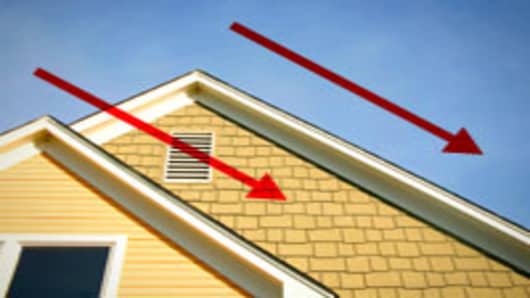There's no question that the home buyer tax credit, which expired at the end of April, pulled home buying demand forward and thus created an inevitable drop-off afterward. It would be wrong, however, to blame the current lull in home buying/selling entirely on the tax credit hangover.
You need only look at a report today from California-based MDA Data Quick, headlined, "Bay Area July Home Sales Down Sharply." Sales in San Francisco in July fell to the lowest level in 15 years, down 19 percent from June and down nearly 23 percent from July of 2009. It was also one of the largest monthly drops recorded.
Blame it on the end of the tax credit? I don't think so. Just look at the median price of a home in the Bay Area: $402,000. In today's tight mortgage market, the income required to buy that home would likely disqualify the buyer from the tax credit, not to mention the fact that someone buying a $400,000 home (and remember half of those homes were more expensive than that) isn't really going to be swayed by an $8000 (or for move-up buyers $6500) tax credit. Yes, half those homes were priced under $400,000, but that's still more than twice the median national average, and again, the tax credit was really aimed at first time buyers on the lower end.
“There’s been a pause in the market. Some potential buyers – including those who held off until the tax credits expired – will take their time to assess market conditions, searching for signs of renewed price cuts," says DataQuick President John Walsh in the release. "Depending on the economy and other factors, that might be what some of them find, especially in areas with a growing number of homes for sale – particularly distressed properties.”
There's even more to it than that, specifically a startling lack of confidence. Today the chief economist for the National Association of Realtors, less than a week before the release of its monthly existing home sales report, warned that this lack of confidence, grounded or not, could pose a bigger risk to recovery than expected.
"As long as people hold back, whether realistically or irrationally, or rationally,' Lawrence Yun says, "then naturally there will be too much supply in relation to the demand, and that could lead to some over-correction in home prices in some markets."
And we didn't even bring up foreclosures in the conversation. Add this to a new report from Zillow.com that one third of all homeowners in the U.S. still think the housing market has yet to hit bottom and nearly the same amount think the worst is yet to come. And another report from Trulia.com (and mind you these are real estate sale Websites) that finds fewer renters than ever now intend to buy and fewer Americans than ever think owning a home is part of the American dream, and dare I say, "Case closed."
Questions? Comments? RealtyCheck@cnbc.com



